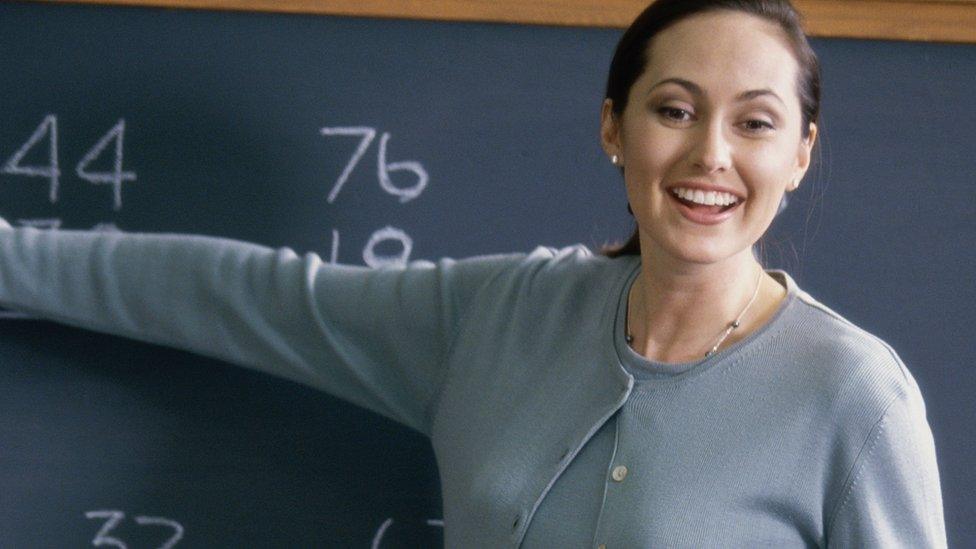Ofsted reprieve for heads who step into failing schools
- Published

All schools will have to become academies under the plans
Heads who take over struggling schools are to be given a two and half years reprieve from Ofsted inspections, to enable them to turn things around.
The plans come in a white paper on schools, which signals a shake-up of teacher training and school governance.
Heads who take over failing schools have long complained that they risk their careers by doing so.
It is hoped the reprieve will encourage more of them to work in challenging areas.
The Education Secretary Nicky Morgan also announced an end to the legal obligation for academies to have parents as governors in all schools.
Instead there will be a greater obligation to consult with parents, and those sitting on a governing board would have to pass a skills test.
The white paper sets out new powers for the Department for Education to force all schools in England to become academies, if they do not have a plan to convert by 2022.
'Incentives'
Laying the plans before Parliament, Ms Morgan said she wants to provide a world class education system for all children, regardless of where they live or what their background is.
She pledged "a new focus on achieving excellence in areas where too few children have access to a good school and there are not yet enough high quality teachers, school and system leaders, governors and sponsors to turn them around".

A shake-up of how teachers train and qualify is also being unveiled
There would be "fair, stretching accountability" focusing on tackling underperformance and "incentivising strong leaders to take over underperforming schools", she said.
This includes giving schools which need improvement, and have appointed a new head, up to 30 months reprieve from inspection by Ofsted, unless the head specifically asks for support from an inspector.
Acting general secretary of the Association of School and College Leaders Malcolm Trobe said he was very pleased that the government had responded on the issue.
"People who take over schools in challenging circumstances need some time in order to be able to make the necessary changes, and the fact that Ofsted will not be making immediate judgements on such schools will be so helpful."
'Subject knowledge'
He said an Ofsted report too soon after a new head has taken over, is a significant disincentive to diligent and talented head teachers to take on a challenging school.
On teacher training, the accreditation system will be changed to increase its focus on a teacher's effectiveness in the classroom.

Analysis: BBC Education Editor Branwen Jeffreys
On the face of it, this bundle of changes gives schools and head teachers greater independence.
It's head teachers who will get to decide if a trainee has the classroom skills that will justify signing them off as a fully fledged teacher.
There is a push to give teachers more freedom in the classroom too.
As long as they get results, there will be less pressure to conform to a teaching style preferred by the inspectors.
But who has the strongest voice in this new system?
Across England thousands of elected parent governors give their time to help their children's' school.
That role will disappear as academies will no longer have to keep places for parent governors chosen by their peers.
Instead there will be a focus on choosing governors for academy trusts according to their skills, who might be parents or might not.

This will lead to the existing accreditation, Qualified Teacher Status, being scrapped and replaced with an accreditation approved by head teachers.
The government says: "The new accreditation will raise the quality and status of the teaching profession, better recognising advanced subject knowledge."
In future, teachers will have to spend longer in the classroom before they qualify, demonstrating their proficiency in the strength of the subject they teach.
But the details of how new teacher training schemes will be different has yet to be decided.
'Mature system'
On mass academisation, the white paper said in 2010 the concept of the "self-improving, school-led system" was set out and that this remained the core of the government's approach.
It added: "The academy system is now sufficiently mature to take a step that wouldn't have been possible in 2010. All remaining maintained schools will be academies or in the process of conversion."
This would take all schools out of the influence and oversight of local authorities, although a league table for multi-academy trusts would be introduced.
The white paper argued that with the best multi-academy trusts able to span geographical boundaries, there would be "real accountability, competitive pressure and choice - improving performance, enabling innovation and scaling success".
But others fear the changes will reduce accountability and may not be manageable.
'Chaotic'
The Institute of Public Policy Research said there was a risk the plans could usher in "a chaotic reorganisation of schools, which neither central government nor school leaders have the capacity to deal with".
"With 16,000 primary schools needing to become academies in the next five years, the scale of the challenge will be immense.
"Over the last five years the government found it difficult to secure enough quality sponsors to take on just 5,000 academies. There is already a source of capacity in the system in the form of high performing local authorities," it said.
Shadow Education Secretary Lucy Powell said: "Most of the schools which will be affected by its forced academisation programme are highly performing primary schools.
"There is no evidence that this agenda will raise standards.
"Indeed, many of the schools and areas which require focused improvement are already academies. The government has no other agenda for school improvement."
The Sutton Trust educational charity said: "The ambitious academies target also requires a huge increase in capacity if it is to succeed. Yet our evidence shows that while some academy chains are very successful, too many are not yet making the difference they should to outcomes for poorer pupils."
- Published17 March 2016